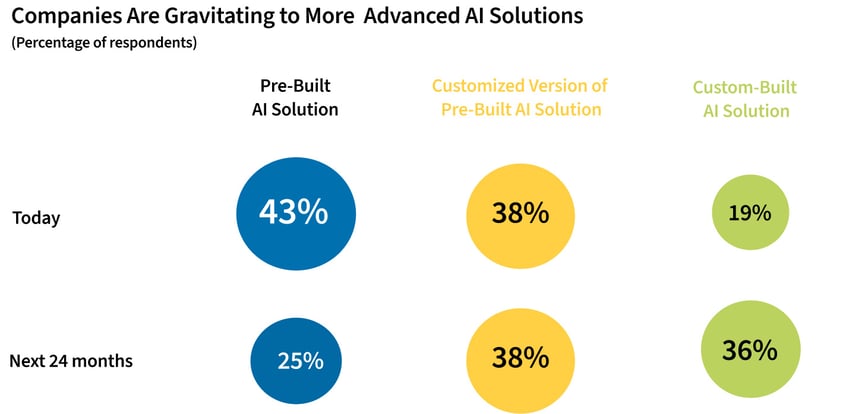While the use of a pre-built AI solution such as Microsoft 365 Copilot is predominant today, organisations are planning to either customise a pre-built solution or use a custom-built AI solution in the next 24 months, according to a study by IDC & Microsoft.
Despite out-of-the-box software offering convenience, it can lack the flexibility needed for specific workflows or industry demands. Tailored AI solutions, built with technologies like Azure OpenAI, provide an opportunity to address these challenges by creating systems that streamline processes and deliver consistent, high-quality results.

Sources: 2024 Business Opportunity of AI | Generative AI Delivering New Business Value and Increasing ROI
The Challenge: Limitations of Microsoft 365 Copilot
Microsoft 365 Copilot often relies heavily on individual users to operate them effectively. For example, tools like Microsoft 365 Copilot can assist with tasks but depend on users crafting effective prompts to produce meaningful outputs. This can lead to inconsistent results when users lack the skills to create precise instructions.
Such variability can create inefficiencies, particularly when organisations require standardised outputs. Existing tools may fall short in providing the level of precision and uniformity needed for specific processes or compliance requirements.
Additionally, workflows that rely on manual inputs or fragmented systems often result in inefficiencies. These challenges highlight the need for solutions that are designed to address specific organisational needs through automation and consistency.
The Solution: Custom AI-Powered Systems
A tailored AI solution offers a way to overcome these challenges, combining advanced technologies to create systems that meet exact requirements. Custom AI-powered systems can take many forms, depending on business requirements and what Azure AI services are used.
For ease of understanding, here is an example of such systems and its key features.
Powered by Azure OpenAI’s large language models, a custom solution can be built to extract key sets of information from user-uploaded documents and then produce content summaries that meet specific business requirements.
Key features of the solution include:
- Standardised Quality Prompts and Processes
Custom solutions can implement standardised prompts, ensuring consistent high quality outputs across the organisation. This approach removes the variability associated with user-driven tools and guarantees more predictable results.
- Automated Document Analysis
Leveraging Azure OpenAI and Azure AI Document Intelligence capabilities, tailored solutions can automate the analysis of documents, such as reports, invoices, or other business records. Automating these tasks ensures a consistent review process and eliminates the risk of human error.
- Standardised Summaries
Instead of a ‘one-size-fit-all' approach, custom solutions can generate summaries of documents tailored to specific organisational requirements. By standardising this process, organisations can ensure consistency and accuracy in their outputs.
What is Azure Open AI?
Azure OpenAI Service provides a robust platform for a wide range of natural language processing tasks. It offers API access to OpenAI’s state-of-the-art language models, including o3-mini, o1, o1-mini, GPT-4o, GPT-4o mini, GPT-4 Turbo with Vision, GPT-4, GPT-3.5-Turbo, and Embeddings model series.
These models can be adopted for various applications such as content creation, summarisation, image analysis, semantic search, and translating natural language into code. This service is designed to cater to diverse requirements, making it an invaluable resource for businesses and developers alike.
What is Azure AI Document Intelligence?
Azure AI Document Intelligence turns documents into intelligent data-driven solutions. It is a cloud-based Azure AI service that enables you to build intelligent document processing solutions. Massive amounts of data, spanning a wide variety of data types, are stored in forms and documents. Document Intelligence enables you to effectively manage the velocity at which data is collected and processed and is key to improved operations, informed data-driven decisions, and enlightened innovation.
The Benefits of a Tailored Approach
Such customised AI-powered systems offer several advantages:
- Consistency and Quality: By standardising processes and prompts, the quality of outputs becomes more reliable and consistent across all users.
- Efficiency Gains: Automating tasks such as document analysis reduces manual effort, allowing teams to focus on strategic initiatives.
- Flexibility and Scalability: Built on platforms like Microsoft Azure AI, tailored solutions can grow alongside organisational needs, adapting to changes in scale or complexity.
- Data Security: Utilising Azure AI services ensures that organisational data remains within the organisation's own network perimeter. This approach guarantees that data is well protected with enterprise-grade safety standards, providing robust security measures to safeguard sensitive information.
Why Consider Tailored AI Solutions?
Generic tools can be useful for broad applications, but they may not always provide the precision, consistency, or scalability required for specialised tasks. Tailored AI solutions address these gaps by offering systems designed around specific needs, ensuring processes are efficient, consistent, and compliant.
Organisations looking to enhance workflows, streamline operations, and guarantee high-quality outcomes may find that custom AI systems provide a more effective alternative to generic tools. With advancements in Azure OpenAI, building these bespoke solutions has never been more achievable.
By exploring tailored AI options, organisations can unlock greater efficiency, accuracy, and scalability in their operations, ensuring they stay ahead in an ever-evolving business environment.
Need support in going beyond your Microsoft 365 Copilot?





.jpg)
